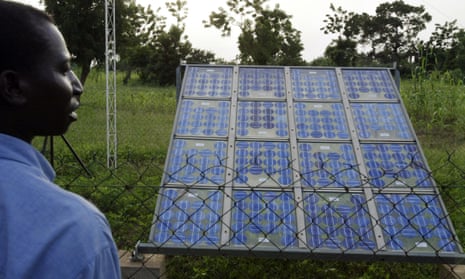Kofi Annan, Bob Geldof, Richard Branson and international business leaders have joined politicians from 14 African countries to launch a global campaign to bring solar power to the 620 million people on the continent who must still use kerosene, candles and wood to light their homes and cook.
A dramatic fall in the cost of solar power, combined with growing access to mobile phones, has given Africa the chance to leapfrog richer countries’ polluting energy sources and to kickstart business, said Annan, chairman of the Africa progress panel and former UN secretary general.
“[Lack of access to electricity] is an injustice that robs millions of our fellow citizens of the dignity, opportunity and freedom that comes with access to modern energy. At present rates of progress, 300 million people in Africa will still lack electricity by 2040. This is intolerable, avoidable and profoundly unfair,” said Annan.
“It leaves the world’s poorest people to pay the world’s highest prices for power. Households are losing out as a result of higher prices, investors are losing out on market opportunities and countries are losing out from failure to harness productive technologies and broaden their development base.”
Annan said that Africa did not have to follow the carbon-intensive pathway and energy practices of the rich countries and emerging countries that have brought the world to the brink of catastrophe. “The UN climate change conference in Paris must draw a line in the sand. Major emitting countries should seize the opportunity to put in place credible carbon pricing and taxation systems and to stop wasting billions on fossil fuel subsidies … we must now come together to break the deadly interaction between poverty and unsustainable energy systems.”
On Wednesday, Nigeria and Sierra Leone signed agreements with Britain to fast-track off-grid solar power to households. A further 12 countries, including Malawi, Senegal and Tanzania, are expected to join the Energy Africa alliance shortly.
“Ten years ago this was not possible. Now it can be turned round easily. The lower costs of solar power have made this possible. Nigeria has 96 million people without access to electricity. Most use kerosene. The default energy source should be solar. That was not available 10 years ago. Now it is,” said the Nigerian vice-president Yemi Osinbajo.
Geldof said that mobile phones allowed people even in remote communities to pay for solar electricity as and when they required it. “We needed technologies to exist before you could electrify a continent and with the advent of this thing we all have in our pocket it makes this doable. This is the moment when Africa switches on, powers up and goes for it.”
Without contributing money at this stage, Britain has pledged to use its offices throughout Africa to help cut red tape, unlock new sources of finance and promote policies to expand household-level solar electricity. It plans to work with donors, investors and lenders, industry and NGO groups, said the international development minister Grant Shapps.
“Energy Africa is a new way of delivering aid. It is about using our influence, getting the commercial markets to work for some of the poorest people in the world. This is about more than switching on lights. It means that the day doesn’t end when the sun goes down … it means not having to walk to town when you want to charge your phone … it means saving money because kerosene is one of the most expensive fuels in the world … It means not giving birth by candlelight,” said Shapps.
Branson, who has worked to develop solar power in Caribbean countries and is planning to invest in a number of solar projects in Africa, said: “Energy poverty and economic poverty are two sides of the same coin. Access to sustainable energy like solar can change all that. It fuels entrepreneurship, it boosts educational opportunities and it’s an incredible source of women’s empowerment.
“Solar is also good for business, and is set to take off around the world. As a businessman I view this transition not as a burden but as a historic opportunity, and I feel strongly that universal access to clean, renewable sources of energy can be achieved in our lifetime – even in this generation.”
Kevin Watkins, director of the Overseas Development Institute, added: “Just a few weeks ago governments adopted a new set of development goals, including a pledge to deliver universal access to energy by 2030. Yet on current trends there will still be some 500 million people in Africa without access to modern energy.
“Africa’s energy access crisis is holding back growth and keeping people in poverty. It is also one of the greatest market failures of our day. Renewable energy technologies are affordable and accessible – and Africa has some of the world’s richest and least tapped sources of solar energy.”
